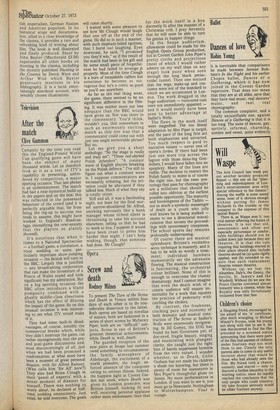'Television
After the match
'Clive Gammon
Certainly by the time you read this the England-Poland World Cup qualifying game will have been the subject of many thousand words. Let us therefore look at it as a test of ITV's capability in presenting, unhindered by competition, a major sporting occasion. That last phrase is an understatement. The match had had a near-hysterical build-up in the papers and on the box: this was reflected in the possessed behaviour of the crowd (and it is perfectly arguable that, far from being the leg-up to success one tends to assume, this might have worked to England's disadvantage, intensifying the over-anxiety that the players so plainly showed).
It's notorious that when it comes to a National Spectacular — a football game, a coronation, a royal wedding or some particularly important show-jumping occasion — the British will turn to the BBC. Largely this is justified — any broadcasting corporation that can make the investiture of a Prince of Wales sound and look significant has my admiration. But on a big sporting occasion the BBC often introduces a bland pomposity combined with a ghastly middle-class cheeriness which has the effect of diluting the impact of the game. So on this unusual occasion it was interesting to see what ITV would make of it.
They had some built-in disadvantages, of course, notably the commercial breaks which, while they didn't interrupt the game, cut rather incongruously into the preand post-game discussions and, most disconcertingly of all, just When we had been promised a confrontation, at what must have been a moment of great personal disaster, with Sir Alfred Ramsey. (Who calls him 'Sir Alf' now?) They also had Brian Clough in their 'panel of experts' with a minor moment of disaster for himself. There was nothing to worry about, he declared at halftime, nodding omnisciently. Just relax, he told everyone. The goals will come shortly.
I waited with some pleasure to see how Mr Clough would laugh that one off at the end of the game. He did so in such a manner, with such elephant-hided egotism, that I burst out laughing. Eyes downcast, he said, "I promised you they'd win," as if the result of the match had been in his gift and by some small piece of forgetfulness he had failed to arrange ,it properly. Most of the time Clough is a bore of formidable calibre but sometimes he becomes so outrageous that he's a comic as good as you'll see anywhere.
As far as the real thing went, the game, there seemed to be no significant difference in the filming. It was neither more nor less adequate than the BBC would have given us. Nor was there in the commentary. You'd think, wouldn't you, that somewhere in such an enormously exciting match as this one was that a commentator could come out with just one single memorable phrase? But no.
Let me give you a short anthology: "So the stage is really and truly set"; "These red-shirted Polish defenders"; "A constant wave of English players breaking on the Polish defence." I've still to figure out what a constant wave is. I suppose commentators are necessarily irritating, but the irritation could be alleviated if they talked less. Much of what they say is totally otiose.
Still and all, it was a fascinating night, not least for the final morsel: narrow-shouldered Sir Alfred, smirking nervously like a bank manager whose richest client is threatening to take his account elsewhere, telling us that he had to work to live. I suppose it would have been cruel to press him harder that night. I can't help wishing, though, that someone had done. Mr Clough?


































 Previous page
Previous page